Phoenix Suns 2025 Offseason Preview: Decisions on Their Big 3
I preview the Phoenix Suns upcoming offseason and potential decisions surrounding Kevin Durant, Devin Booker, and Bradley Beal.
Last year, I called the 2024-25 Phoenix Suns season a “make-or-break” season. They were set to spend $400 million on their roster in 2024-25, and $500+ million between their payroll and luxury tax to keep the team together in 2025-26. I didn’t see any way they’d continue this team for anything less than a Finals appearance.
Not only did they not qualify for the Play-In Tournament, but they’re set to convey a valuable lottery pick to the Houston Rockets. The Suns appear set on making major roster changes to find a winning formula and significantly reduce expenses.
Earlier this month, I spoke with Gerald Bourget about the Suns and their upcoming offseason. I highly suggest you check it out as a companion for this piece. I think their summer will revolve around their big three, so I wanted to take a deeper look at their respective situations and how they could play out.
Kevin Durant trade
The Phoenix Suns will reportedly work with Kevin Durant on finding a trade for him. I can’t recall this type of language about a player’s future after a team failed to trade him ahead of the trade deadline. Durant’s recent comments on Twitter seem to confirm this sentiment.
According to ESPN, the Suns were in discussions on a three-way deal to receive Jimmy Butler, Jonathan Kuminga, Jonas Valanciunas, and two first-round picks for Durant. That is far below the package they originally sent out to acquire Durant, but a strong return for him given his age and the circumstances. I wouldn’t expect them to get this type of return for him this summer, but it’s a helpful blueprint for identifying teams.
I don’t know if an offer of that caliber will be available, but I don’t expect them to take back as much salary in such a deal. The Suns’ current roster will exceed $460 million once they reach 14 players. I think it’s safe to assume not only will they get below the second apron, but also get as close to the luxury tax line as possible (if not duck it altogether).
The Suns will likely decline the $8.1 million team option of Vasilije Micic and waive the non-guaranteed salary of Cody Martin (June 30, 2025 guarantee date). Those moves will reduce roster expenses by $110 million and leave them roughly $7 million above the second apron. This would leave them in a position to get below that threshold just by trading Durant.
As mentioned on the show, I have questions about the reported list of teams interested in Durant: the Timberwolves, Knicks, Rockets, Spurs, and Heat. These mostly sound like a list I could see Durant being interested in. I’m sure we’ll have more teams get in the mix as more teams get eliminated from the playoffs. I mentioned the Nuggets and Bucks as two teams I could see making aggressive offers for Durant.
I’m more interested in the potential framework than his destinations. The Suns will be $27 million above the luxury tax line after cutting Micic and Martin. Is there a way they can avoid it in a Durant trade? That’s unlikely since that’s half his salary for 2025-26. But the more teams involved, the more the Suns could save.
For example, let’s say the Suns want to trade Durant to the Mavericks for their 2025 first-round pick (projected at 12), their 2031 first-round pick, and several players. The Mavericks want to pair him with Anthony Davis and Kyrie Irving, so they must send out Klay Thompson, Daniel Gafford, P.J. Washington, and Caleb Martin to make the salaries match1. However, this framework wouldn’t save the Suns much money, so they don’t want to take Thompson back.
To solve this, they expand this trade to include an additional team willing to take Thompson on. This would bring the Suns' roster expenses down from $350 million to $210 million. They’d also be just $5.6 million above the luxury tax, meaning they can easily get below it later with another trade.
If the Suns are creative, they can get below the tax in one fell swoop.
Bradley Beal buyout?
At some point, Bradley Beal may realize that staying with the Suns may not be worth flexing his no-trade clause. The situation there was pretty bad for him last season. I’m not sure moving on from Mike Budenholzer will improve things. For what it’s worth, John Gambadoro believes there’s a 0% chance of Beal returning next season.
As I mentioned in the discussion, teams could be willing to acquire Beal with the caveat that he declines his $57.1 million player option for 2026-27 and extends at a lower amount. But what’s a structure that makes the short-term pay cut worth it?
Rudy Gobert recently took a 25 percent pay cut and extended for an additional two years, $74.5 million. The equivalent for Beal would be dropping his salary to $43 million, then adding two years for roughly $90 million.
That’s still a significant investment for a player whose salary is worth arguably at least half his current output. I’m skeptical any team would be willing to sign him to this type of extension.
If a trade is off the table, the soonest way they could realistically get him off the team is through a buyout. There is a challenge with him having an additional year left on his deal, but thankfully, there is a precedent for this situation.
Kemba Walker and Blake Griffin are the two most recent examples of players earning maximum salaries receiving a contract buyout with an additional year left on their respective deals. Walker surrendered $20 million, or 27.15 percent of his remaining two years, $73.7 million. Griffin surrendered 23.6 percent of his salary on the additional year remaining on his deal.
Let’s say Beal gives back 25 percent of his remaining $110.8 million over two years. His dead cap hits could look something like this:
2025-26:
$53,666,270-> $40,249,7032026-27:
$57,128,610-> $42,846,458
As Bobby Marks notes in his Suns offseason guide, Beal’s remaining $110.8 million cannot be stretched. That’s because the $22.6 million dead cap hit that would be spread over the next five seasons, in addition to the $3.8 million they already have in stretched dead money, would exceed 15 percent of the 2025-26 salary cap2.
However, the Suns could stretch Beal’s contract if he lowered his guaranteed portion by 25 percent. This would result in a dead cap hit of $16.6 million over the next five seasons, leaving their stretched dead cap total to $20.4 million. That is well below $23.2 million, or 15 percent of next year’s $154.6 million salary cap.
The short-term savings from reducing Beal’s remaining guaranteed portion by that much and stretching the remainder over five years are immense. It would reduce their payroll by as much as $37 million, which, in conjunction with cutting Micic and Martin, would get the Suns below both apron levels and the luxury tax line. We’re talking close to $300 million in savings without needing to trade Durant, which could allow them to hold onto him into the season if offers aren’t satisfactory.
I could see the Suns buying out Beal if he’s willing to surrender that much money. The biggest question for him, at 32 years old, is whether he can recoup it. Walker agreed to his buyout with the Thunder in large part because he got it back immediately with his two-year, $20 million deal with the Knicks. Griffin, on the other hand, didn’t make up all the money, but at that point in his career, he prioritized competing for a championship. Beal would probably make up that money over the next two years by earning the mid-level exception.
The stretching component doesn’t impact Beal’s earnings, but it would leave a mark on the Suns’ books. I’d avoid stretching and eat the bigger dead cap hits to get them off the books sooner rather than later. The ~$13 million in savings would be enough, along with cutting Micic and Martin, to put them below the second apron and leave them $16 million above the luxury tax line. They could get below the tax with a Durant trade later.
Devin Booker’s future
It feels like the Suns will trade Durant, shift pieces around Booker, and see if their new roster will yield better results. They have no other way to meaningfully add to their roster beyond trading Booker or Durant. After trading most of their draft equity for Durant and Beal, they can only trade one more first-round pick and three second-round picks3.
Booker will become eligible to extend this summer for up to two years, $149.8 million. According to Brian Windhorst, the Suns are expected to offer it. These are the projected cap hits:
2028-29: $72,042,250
2029-30: $77,805,630
Booker has been a top 10 player at the peak of his powers, but has been closer to a top 20-30 player this season. His current contract, earning 35 percent of the salary cap, already feels questionable if he can’t get closer to the top 15 level. I don’t see the rush in extending Booker for maximum dollars with three years left on his deal. I’m certain he’ll accept it if offered.
An extension likely won’t stop speculation on his future. The league will keep an eye on the Suns' performance next season. Teams will monitor if cracks form if they’re on pace to have another season on par with the one they just had. This could lead to a Booker trade, even though the Suns intend on keeping him.
Booker could still be traded ahead of the February 5, 2026 trade deadline if he extends by August 5, 20254. The thing he may be giving up by accepting an extension now is some level of control over his destination. This is what happened to Damian Lillard, who was traded to Milwaukee a year after signing a two-year maximum extension with the Blazers. Booker may still have somewhat of a say, but the Suns would have control of his destiny if he’s under contract through 2030.
I understand if the Suns extend Booker to make him a Suns-lifer. But I struggle to see how this raises his trade value. According to Windhorst, he believes there will be fewer max contracts and extensions given to players in the middle of their careers. If many teams around the league are preparing to have a stronger negotiating stance with All-Stars who aren’t elite players, then what exactly are the Suns getting ahead of by locking up Booker this early?
If fewer max contracts become the new normal, then I’d argue that some of the value in acquiring a player like Booker now is the ability to negotiate his next contract later. Teams could lose interest or lower their respective offers if he’s already earning max dollars in his age-32 and 33 seasons.
If the Suns continue to struggle and a trade becomes an inevitability, the Rockets make a lot of sense on paper. They could use a scorer like Booker to improve their offense. The Suns could receive several talented young players to build around and perhaps remain competitive with.
They could also get several of their future first-round picks back5, but that wouldn’t allow them to enter a rebuild. They also owe multiple first-round pick swaps to the Wizards, Magic, and Grizzlies. They can’t fully bottom out without control of their swaps, but getting some of their picks back would relieve some of the pressure to produce at a high level each season.
This framework would allow the Mavericks to exceed the first apron, but it hard caps them to the second apron. They’d need to do some more work to fill up the backend of the roster afterward. Kyrie Irving declining his $43 million player option and re-signing at a lower amount would help.
The rule for waiving and stretching a player between July 1 and August 31 is that the remaining guaranteed portion is spread over twice the number of years remaining + 1. So $110.8 million / 5 = $22.6 million.
The Suns could only trade their 2031 first-round pick at the trade deadline, which they parlayed into three likely late first-round picks in 2025, 2027, and 2029 in a trade with the Jazz. This opened up the possibility for them to trade a maximum of three first-round picks in those seasons. However, they traded their 2026 first-round pick to the Hornets at the trade deadline. This blocks the Suns from trading their 2025 and 2027 first-round picks, due to the Stepien rule prohibiting teams from trading first-round picks in consecutive years. Their 2030 first-round pick is also prohibited from being traded since they traded their 2031 first-round pick. This means they can either trade their own 2028 first-round pick or the 2029 first-round pick they received from the Jazz.
Players who sign extensions that exceed a 120 percent increase on the first season, exceed 5 percent raises on subsequent years, or exceed four seasons in total (including the current one) cannot be traded for six months.
The Suns traded their 2025, 2027 and 2029 first-round picks to the Nets as part of their package for Kevin Durant. Last year, the Nets traded those selections to the Rockets.



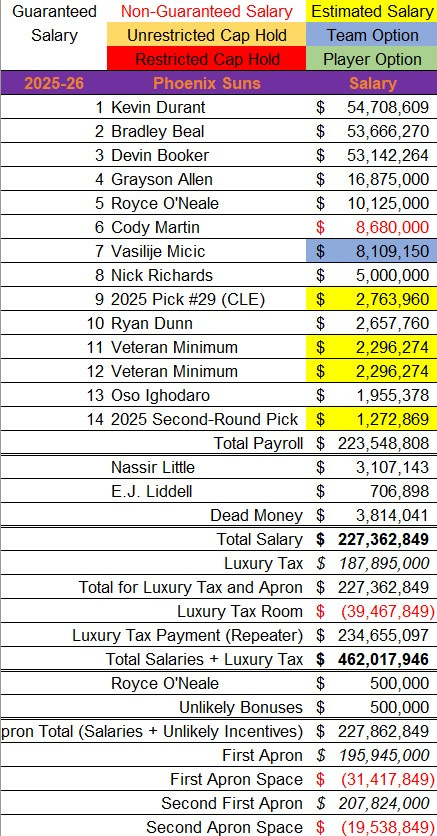
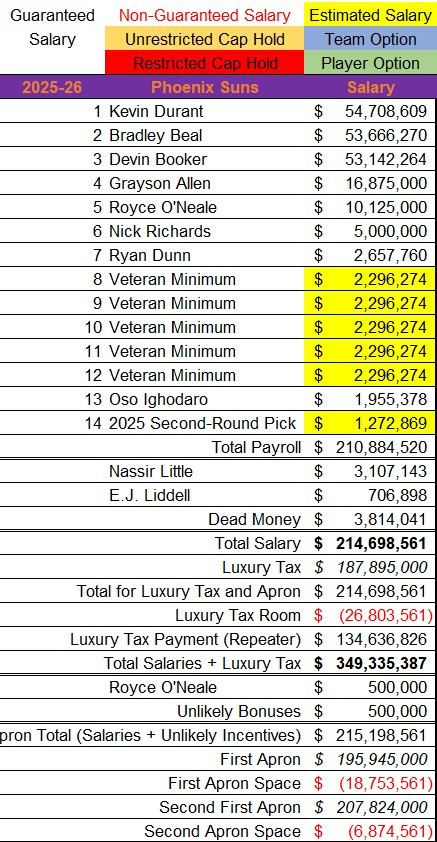
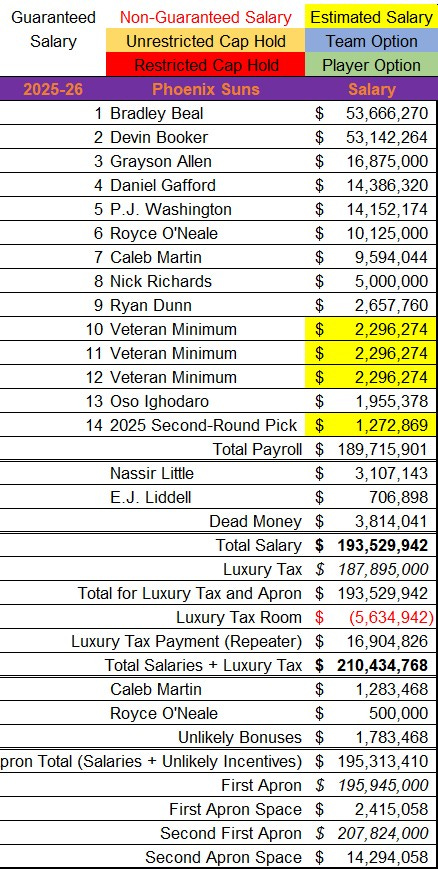
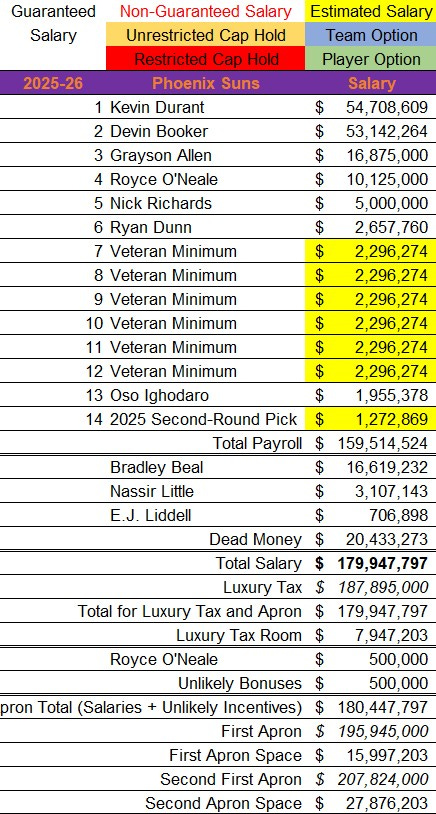
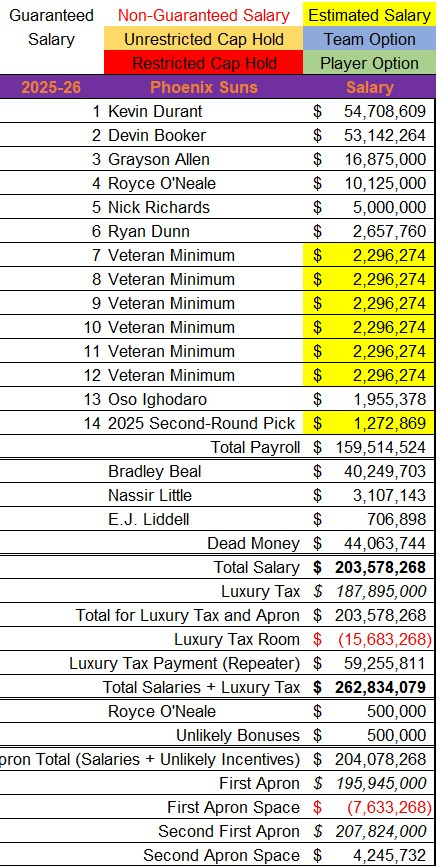
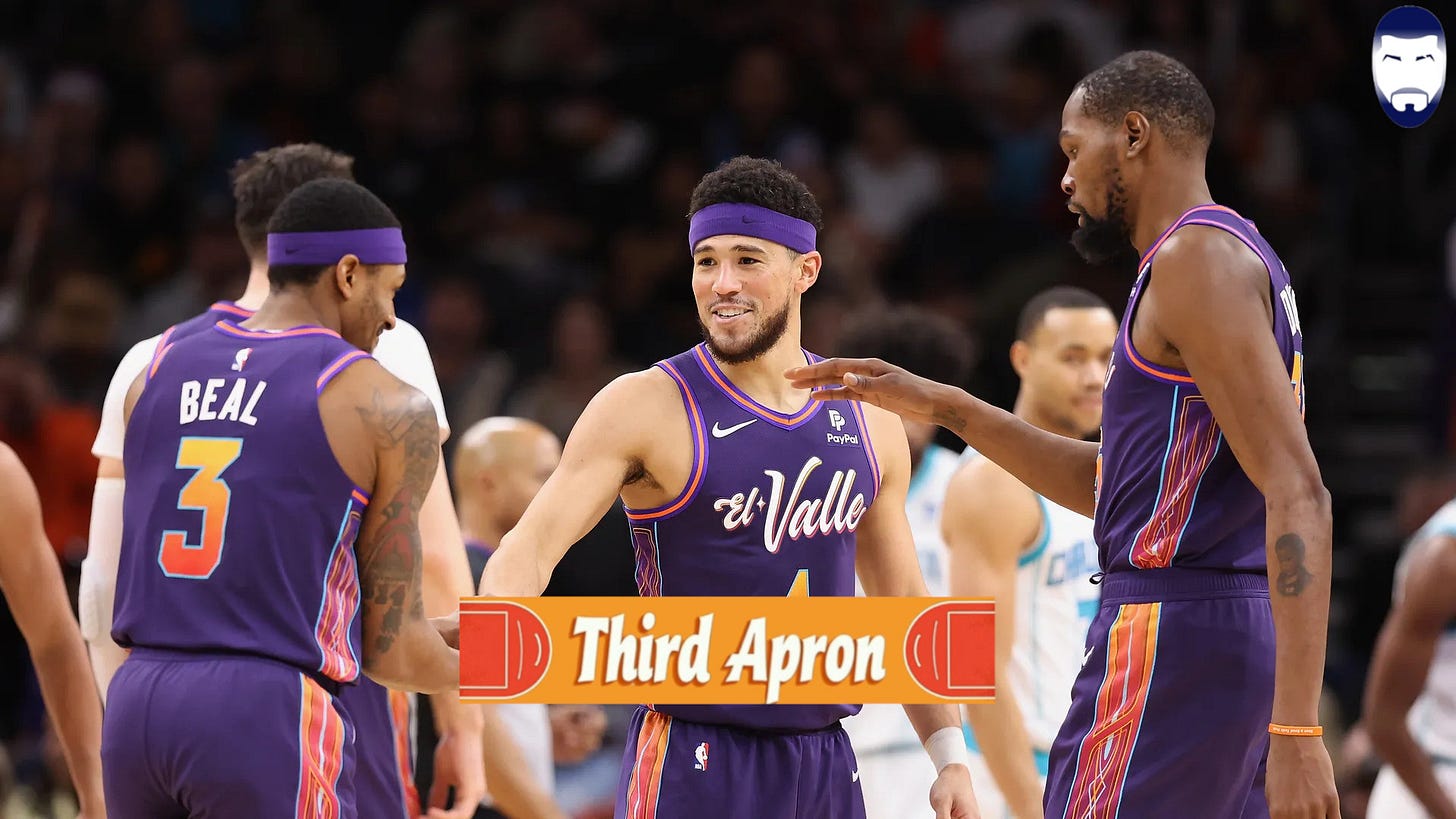
Great analysis. Do you believe that if the goal is to get back to the NBA Finals and win a championship (as it should be) that the Suns should be building around Booker? While they were two wins away in 2022, he hasn't shown any signs of being a #1 on a championship team since then. I understand that this is one of the franchise greats, but there needs to be a reality check in my opinion. HOU will be motivated to get a deal done but I understand that PHX's outgoing swaps will make it difficult to bottom out
Good piece.
I think moving Booker to HOU allows them to reasonably bottom out:
1. They can get their 2025 & 2027 & 2029 picks back
2. they might be able to squeeze the 2027 BRK-HOU swap out of HOU
3. Booker also likely forces better Talent out of HOU than KD would
But most importantly:
4. it allows PHX to move KD in Another Trade for other assets
Wait, even more important:
5. it gets those picks back before they risk going to MIL for Giannis
It's the best option: Book gets the max return from HOU, while KD still can be moved elsewhere. I don't expect massive return for KD, but those three picks back from HOU is critical to avoid having the entire balance of the decade wash out. Watching them go to a tanking MIL would be death.
At some point they have to look at the 2026 & 2028 swaps as sunk costs. The 2028 incoming pick would be from one of a trio of other teams with massive issues as well (BRK, PHI & WAS), making it unlikely to be a late round pick. It's why the 2027 BRK-HOU swap is potentially interesting, as is whatever they can get for KD - pieces to fill in not having the 2026 pick, and dropping down the draft board in 2028.
Of course so much of this is moot. Ishibia and his Advisor(s) don't at all grasp the dire straights they are in. Ego, not understanding the CBA restrictions, or... whatever. Nor do they grasp that they have a very narrow window to get those picks back from HOU.